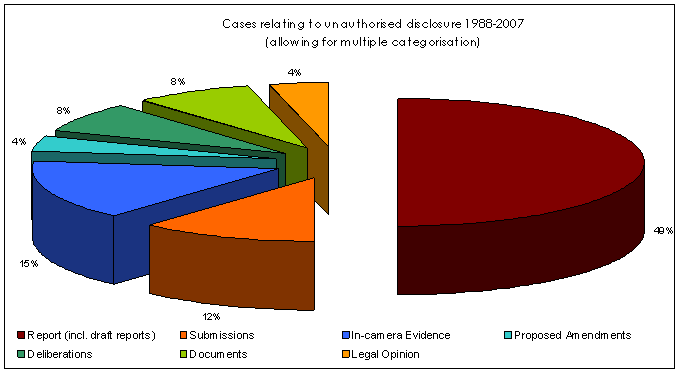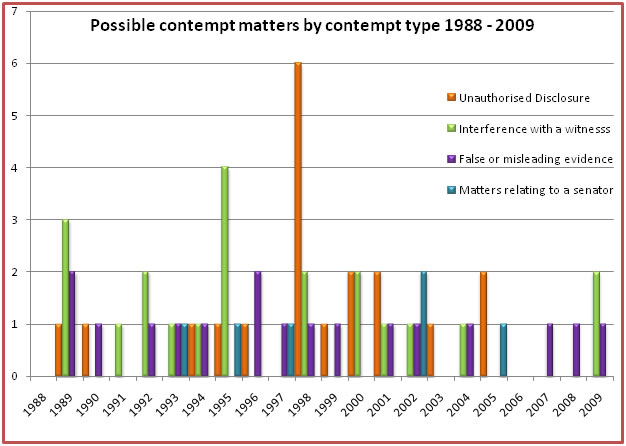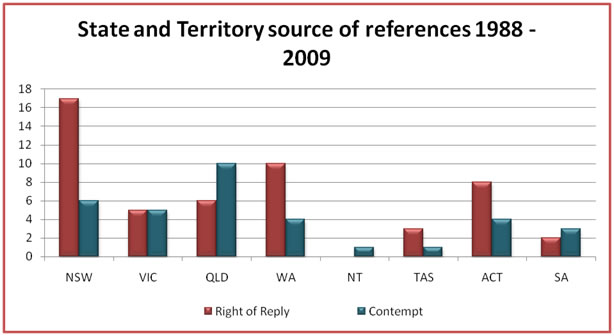Work of Committee of Privileges: Some Facts and Figures
Contempt references
Since 1966, the Committee of Privileges has tabled 62 reports on cases of possible contempt, based on 75 references from the Senate. In some cases, more than one type of contempt can be involved in the one inquiry such as the various matters arising from the hearing of the Economics Legislation Committee on 19 June 2009, the subject of two references covered in Report no.142; in other cases, the committee has elected to table together in a single report the results of its inquiries into several distinct references with similar features, such as the six references relating to the unauthorised disclosure of documents in Report no.74.
The committee has, for the purposes of this summary, recognised four broad types of possible contempt: the provision of false or misleading evidence to a senator or a Senate committee; the unauthorised disclosure of documents, oral evidence or reports of the Senate or a Senate committee; interference with witnesses, namely cases in which persons giving information to a senator or a Senate committee have been threatened with some form of reprisal or have been penalised in some way for giving, or preparing to give, such information or evidence; and matters relating to a senator, such as molestation or harassment of a senator, attempts to influence a senator’s conduct and matters relating to senators’ interests.
Since 1966, there have been 22 completed cases relating to possible unauthorised disclosure of committee reports or proceedings. Allowing for multiple categorisation, the disclosures in question were reports or draft reports (13), submissions (4), in camera evidence (4), proposed amendment (1), deliberations (2), documents (1) and legal opinion (1). In the same period there have been 23 completed cases relating to possible interference with witnesses, 18 of possible false or misleading information and nine of matters relating to a senator. Figure 1 shows a breakdown of cases relating to unauthorised disclosure from 1988 to 2007. It is noteworthy that there have been no referred cases of possible unauthorised disclosure since the committee recommended new procedures in Report no.122.

Figure 1: Cases relating to unauthorised disclosure 1988-2007
A breakdown of possible contempt cases by type of contempt from 1988 onwards is shown (below) in Figure 2. As that figure shows, the types of possible contempt referred vary considerably from year to year.

Figure 2: Possible contempt matters by contempt type 1988-2009
Findings of contempt and penalties imposed
Of 75 possible individual contempt references within 62 contempt reports, contempt has been found in 14 cases. In the majority of the earlier cases, the committee concluded that the contempt was inadvertent and that the perpetrator(s) acted out of ignorance of the possible parliamentary privilege consequences. This appears to be increasingly not the case, however.
In two cases a penalty has been applied: the committee’s first report, in 1971, recommended a reprimand, which was duly administered by the President in the Senate chamber; while its 99th report recommended a reprimand, which was administered in writing by the President. In three other instances, the committee has recommended a conditional penalty: a fine if there is a re-offence within the life of the Parliament (Report no. 8); prosecution, if the source of the leak is disclosed (Reports nos 54 and 99); and the publisher’s access to Parliament House to be curtailed if there is a re-offence (Report no. 99).
Public officials' involvement
Since the committee’s inception, of the 66 cases broadly categorised as involving possible contempt, 34 have involved in some capacity public servants, statutory officers or staff of government agencies at federal, state or local government level. In twenty cases, the possible contempt question related to 23 activities in their official capacity of the public officials concerned.
While public officials constitute the largest category of persons against whom possible contempt allegations have been made, other groups are also significant. Members of Parliament themselves and/or their staff are increasingly being involved in possible contempts (16 cases); followed by journalists or publishers (9 cases); the police service has been involved in four possible contempts; universities, and banks or credit unions have been involved in two each; with the remainder comprising private individuals from a variety of occupations.
Geographic source of references
The majority of the committee’s references is generated partly or solely from parliamentary committee activities, particularly in their dealings with federal government departments, agencies or ministers’ offices. Possible contempts which took place outside the parliament are shown in Figure 3, as is state or territory of residence of the person or organisation seeking redress under the Senate’s right-of-reply procedures. Since 1988, every state and territory has been the source of at least one reference involving possible contempt, while all but the Northern Territory have contributed at least one right-of-reply case.

Figure 3: State and Terrirtory source of references 1988-2005
For further information, contact:
Committee Secretary
Senate Standing Committee of Privileges
PO Box 6100
Parliament House
Canberra ACT 2600
Australia